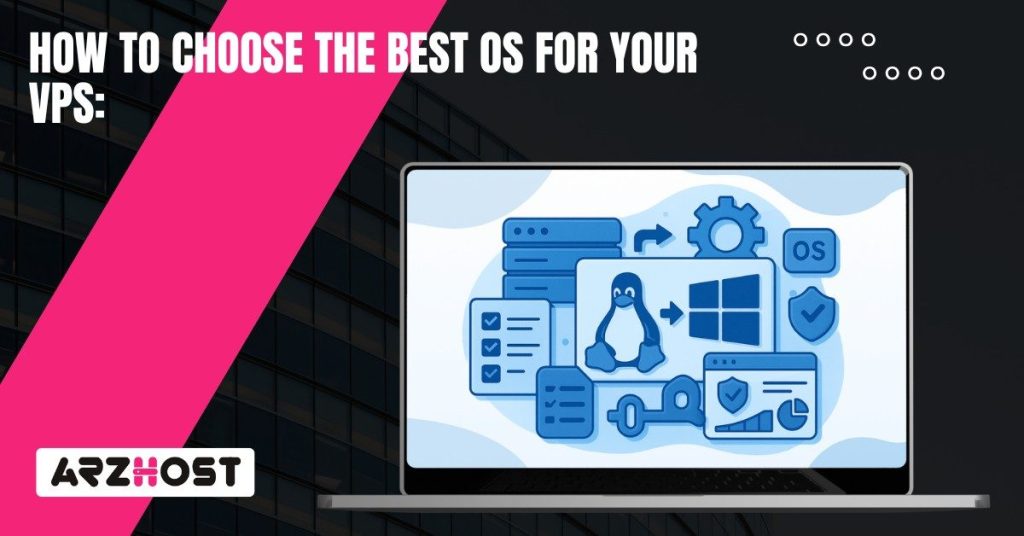
The type of operating system you select with your VPS hosting defines the way your server will perform, the level of security you are going to have, and the kind of software environment you can build on top of it.
The Best OS for VPS controls resource allocation, package management and compatibility with frameworks. It directly affects performance and stability. As an example, Linux distributions such as Ubuntu, CentOS, or Debian are commonly used when the LAMP stack is used to host a web application. Windows server is however favored where a business needs to serve ASP.NET, Microsoft SQL or have it integrated with an active directory.
Knowing the strengths and trade-offs of each system will assist you in selecting the platform that does in fact satisfy your workload. This guide will cover the most popular server operating systems, their places of best use, and give you the background to make a clear choice.
VPS Hosting divides a physical server into a virtual machine thus you have a greater control over shared hosting but without incurring the expense of paying a whole dedicated server. Every virtual machine has its own processor, memory and disk, meaning that your site or app does not slow down due to the traffic of another person. It is all centered on the operating system. It controls memory and processor consumption, offers the security model, and decides what software stacks are actually runnable.
OS reliability is important since downtimes or continuous patching may negatively affect performance. Security features also matter as an improperly configured system or an outdated system will expose you to exploits. Maintenance is a lot easier with active support, be it having a solid Linux community or official updates provided by Microsoft. OS selection is not a trivial matter, as it determines the ability of your VPS to address the workloads and the comfort of the daily operation.
Take Your WordPress Site to New Heights
Optimized for WordPress—Get Your Hosting Plan at just $0.99/month.
Click HereIn the case of VPS hosting, it generally boils down to Linux or Windows Server. Linux operating systems such as Ubuntu, CentOS, and Debian are a favorite due to their light weight, flexibility, and free nature. They are suited to web applications using the LAMP stack. Windows server (2019 or 2022) is preferable when you require asp.net, microsoft SQL or active directory.
When it comes to VPS hosting, Linux Operating Systems Servers are usually the first option, since it will provide you with the flexibility, control, and you do not have to concern yourself with the costs of the licensing. They use less server resources efficiently and are designed with sound security consideration and are reliable enough to support small personal sites as well as business applications that require high performance.
One of the most popular selections is Ubuntu Server. The release of the long-term support is continually updated over the years, and its massive support in the community and excellent documentation make it easier to troubleshoot in case something goes wrong.
CentOS Stream, Rocky Linux, and AlmaLinux are reputable in the area where stability is the most important factor. They come after Red Hat Enterprise Linux and that makes them a sure thing in case you need enterprise level reliability with the possibility of professional support.
Debian is known to be very stable and lightweight. Programmers prefer it since it does not change and does not come along with some additional software that gets in the way.
Fedora and Arch Linux are powerful alternatives to users who wish to go a notch higher. Fedora releases new features faster and is good when you are comfortable with updating frequently, whereas Arch provides you with almost complete control over configuration but is harder to maintain.
Microsoft Windows Server, particularly 2019 and 2022, is typically the default platform when a VPS must support applications based on Microsoft. It completely fits with ASP.NET, MSSQL and other software which just do not work well on Linux. In case your project is dependent on such tools, it is generally easier to deploy and run on a windows server.
The trade-off is that it will be associated with licensing costs that will increase the total cost when compared to free Linux distributions. It is also resource intensive and thus you will find yourself using more CPU and memory to maintain the performance at steady rates. Despite this, in the case of firms that exist within the Microsoft ecosystem, the benefits tend to exceed the additional demands.
It is the operating system which forms the entire VPS experience. Linux offers efficiency, freedom and open-source flexibility, but windows server provides smooth compatibility with Microsoft workloads. The correct option is actually determined by the stack that you want to operate and how you would rather manage your surroundings. Selecting the right OS at the first phase would help to avoid the inconvenience in the future since it may be time consuming and costly to switch once all the work has been completed.

The selection of the optimal operating system to your VPS is not merely a matter of selecting the most popular or powerful one. It is just a matter of what best fits you and what you are comfortable with to manage the system. Look at what you need in your project and how the OS will assist you in realizing your goals in terms of performance, security and cost. The key things to note are the following.
Windows Sserver or Linux Distros which have control panels may be better suited to you in case you want a graphical interface and easier management. Assuming that you are fine with operating in the terminal, command-line Linux choices such as Debian or CentOS allow greater control and efficiency of resources. How well you will manage to uphold your VPS will depend directly on the familiarity that you have with each of the environments.
There are various applications that are compatible with the various operating systems. PHP and MySQL based websites tend to work best with Linux while .NET applications need windows server. Java is platform-flexible, but can sometimes work better with some configurations. Fitting your stack to the appropriate OS decreases the compatibility and downtime.
Systems have different security tools. Distributions of Linux have a tendency to use SELinux or AppArmor to implement granular permissions and sandboxing. Windows server has windows defender and a powerful firewall. The choice of which fits depends upon the degree of protection you require, and the general ability of your team to operate at advanced levels of configuration.
Windows Server is a licensed package, which incurs on-going expenses. Linux is normally free, but you can pay to have professional care or a control panel which makes the administration easy. Compare the recurring costs with the price of convenience and reliability in your case.
Your VPS is supposed to change with your needs. Certain operating systems are easier to upgrade and they are more compatible with hosting services or cloud providers. The ability to scale and compatibility with a wide range of software can save time and avoid delays as your project grows.
The correct OS can frequently be determined by what exactly you are attempting to accomplish with your VPS. Various configurations will require varying levels of strength, so these are some of the most common situations where operating systems are likely to perform better in real-life VPS hosting.
Remote Work Made Easy
Secure & Fast Window VPS by ARZ Host– Start for Just $18/month with Our Limited-Time Offer.
Click HereSelecting the appropriate operating system that will run your VPS is merely a matter of aligning your technical requirements with the capability of the operating system. Pay attention to how any of it will be useful to your applications, resource management and server security.
Scalability and continued support are what should be important, rather than what is popular today. There is no need to fear trial environments to test various systems before investing. Experimental testing will give you a feel of what arrangement is more comfortable and efficient to your hosting needs.
Boost your online visibility with ARZ Host cutting-edge offerings that will help your website load quickly and offer a flawless user experience
Yes, but it generally involves restoring all files and then reinstalling the new operating system in its entirety. To deal with this, most providers have a rebuild or reinstall button in their dashboard. All you have to do is anticipate downtime and make sure that your applications and information will be compatible with the new system before switching.
Typically the point of entry is Linux because it is free, lightweight, and there are numerous guides to be found online. Distros such as Ubuntu are rather easy to set up thanks to the community support and control panel features. Windows may be more comfortable with a former Microsoft user, but it is bulkier, licenced, and to get the most out of it, one needs to navigate the Windows server tools.
Most container tools are optimized to run on Linux, making Linux systems the choice of container-intensive applications. Virtualization itself is largely independent, although you will want to be assured that your host can support nested virtualization in case you want to spin up additional VMs within your VPS. Choosing an OS that is compatible with these tools saves a lot of friction in the future.
Root exploits or old package vulnerabilities are the common vectors used on Linux servers, so updates and SELinux or AppArmor and tight permissions are used to keep the servers locked down. Windows Server can be more vulnerable to brute-force access and malware, which is why you will want Defender turned on, patches installed promptly, and password policies strengthened. In any case, a firewall and some basic hardening is a prerequisite.
ARZ Host provides 30 days money back and trial access in the VPS packages. Linux can be tested by the users without commitment such as Ubuntu, Debian, Rocky Linux, AlmaLinux and CentOS Stream. Time limits are offered when it comes to windows server reviews. All of the plans are equipped with free backups, a control panel, and 24/7 support, which is why it is not hard to try before you commit.
Definitely. The operating system uses system resources too, so a lighter OS leaves more CPU and RAM available for your apps. Lean Linux distributions tend to be faster on smaller VPS plans, while Windows Server can drag performance if resources are tight.
Yes, quite a bit. Linux distros thrive on community forums and guides, but you can also buy enterprise-level support if needed. Windows Server comes with official Microsoft support, though that’s tied to licensing costs. Choosing the support style that fits your skill level and urgency makes troubleshooting much easier.
Latest Posts: